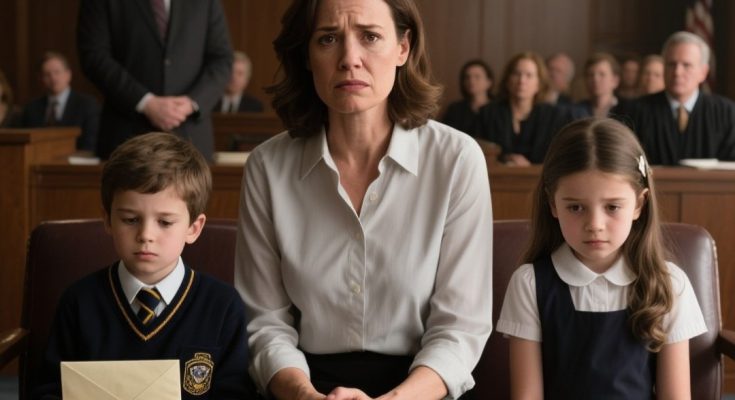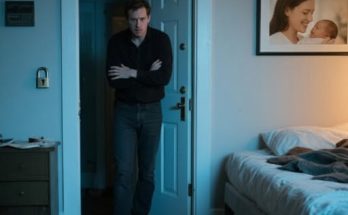I kept my mouth shut and my jaw clenched, even though my hands trembled.
I refused to let them see me break. The judge’s slow nod felt like silent agreement—with them. It was as if the air had been sucked from my lungs.
All I could think about were my children, Luca and Arya. What would happen if they were taken from me and placed with a man who cared only about control and appearances?

I didn’t have a high-powered attorney like Derek. In truth, I couldn’t afford one. But I was present. I was doing the best I could. That had to count for something.
Just as panic threatened to swallow me, my exterior composed, inner chaos screaming, Luca stood up.
“Mom,” he said firmly, “can I show the judge the letter I found in Dad’s safe?”
Everything froze. Heads turned. Derek stiffened. His attorney looked as if a gust of wind had knocked her off balance. Even the judge went silent.
I didn’t understand what Luca meant. My heart raced. Still, I nodded.
He walked to the bench, holding a folded piece of paper in his small hand. In that moment, everything shifted.
I wasn’t always the quiet woman sitting in court, barely able to speak. Once, I was confident. I had a career, friendships, plans.
But marrying Derek changed me. He seemed charming at first—supportive, generous.
“You’ve earned it,” he said, encouraging me to stay home with the kids.
I didn’t realize I was giving up my independence, my safety net, and eventually, my voice.
After Arya was born, he grew more controlling. Every expense scrutinized. If I didn’t use a coupon, he withdrew into silence. If I spoke of returning to work, he reminded me, “Good moms stay home.”
By the time he left, I had nothing. No savings, no attorney, no support. Derek cut off our bank account and moved in with someone else.
He hired a lawyer immediately. I went to the courthouse legal aid office with a folder of receipts and school records.
We lived in a tiny apartment. I worked two cash cleaning jobs just to pay rent. No internet, washing clothes in the bathtub.
I boiled water to warm their baths. Luca never complained. Arya hummed while I scrubbed socks. I didn’t even tell my mother how hard things were—I couldn’t face the shame.
When Derek filed for full custody, he claimed I was unstable, unreliable, and poor. His lawyer displayed polished images of his life—spreadsheets, photos, luxury.
I came in wearing borrowed clothes, carrying a plastic folder with rent receipts and school notes. I knew it might not be enough—but I showed up.
That morning, walking into court, Luca asked,
“Will it be okay?”
I smiled and said,
“Yes, baby.”
But I didn’t believe it.

In court, Derek wouldn’t meet my eyes. His lawyer listed everything I lacked: housing, a car, money.
“This isn’t neglect,” she said, “it’s poverty. But poverty is a risk.”
I wanted to scream. To tell them about nights I went hungry to stretch cereal, about selling my wedding ring to buy coats.
But I stayed still. In court, emotion is weakness.
The judge nodded as if every word made sense. My stomach sank.
Just when I thought I might break, Luca tugged my sleeve and asked to speak. Then he handed the letter to the judge.
The courtroom shifted as the judge read it: a document from Derek’s accountant, dated before the divorce.
It outlined plans to hide assets, manipulate income, and retain control.
“Keep custody if possible,” it read, “or appear financially and morally superior to limit appeal.”
The judge paused. Eyes turned to Derek. Even his lawyer looked stunned.
The judge turned to me.
“Were you aware of this letter?”
“No, Your Honor.”
“And your son found it?”
I nodded.
“Yes, he never told me before today.”
Luca looked up.
“I just wanted to help. I found it looking for my tablet.”
The judge nodded solemnly.
“You did the right thing, young man.”
He suspended Derek’s visitation and ordered a formal inquiry. I sank into a seat, clutching my kids.
“Did I do something wrong?” Luca whispered.
“No,” I said.
“You saved us.”

Over the next weeks, the investigation revealed offshore accounts, hidden transfers, falsified tax records.
With every report, a part of me—long buried—returned: confidence, clarity, the belief that maybe I hadn’t been crazy.
At the final hearing, I had legal support from a nonprofit. Derek looked pale, his bravado gone.
The judge began,
“There is clear evidence of financial deception. Ms. Maro, your dedication and honesty speak louder than any spreadsheet.”
Then came the words I’d dreamed of: full physical and legal custody.
The judge ordered Derek to pay back child support and limited his visitation to supervised.
I didn’t cry at first—I was afraid it might vanish. But it didn’t. The gavel fell. It was real.
That night, we had pancakes and danced in the kitchen. Later, sitting on the floor with both kids in my lap, Luca showed me a drawing: a house with three stick figures. Above it, he’d written,
“Home is where Mom is.”
That letter wasn’t just evidence—it was salvation. He could’ve kept it secret. But he didn’t. Even at seven, he knew what was right.
It’s been six months. Derek vanished. We haven’t heard from him since. Life has begun to bloom again.
Luca draws comics now—one shows me as a superhero with a cape, saving the day with waffles and truth. It’s on the fridge.
I work part-time at an office and attend evening classes. Arya has a best friend. Luca’s art decorates the school hallway—a tree with deep roots and one word beneath:
“Growing.”
And that’s what we’re doing—growing. Slowly. Steadily.
Toward light, toward peace.
The smallest voice in the room—the most honest—changed our lives. Not with power or wealth, but with courage, truth, and love.
And that made all the difference.



